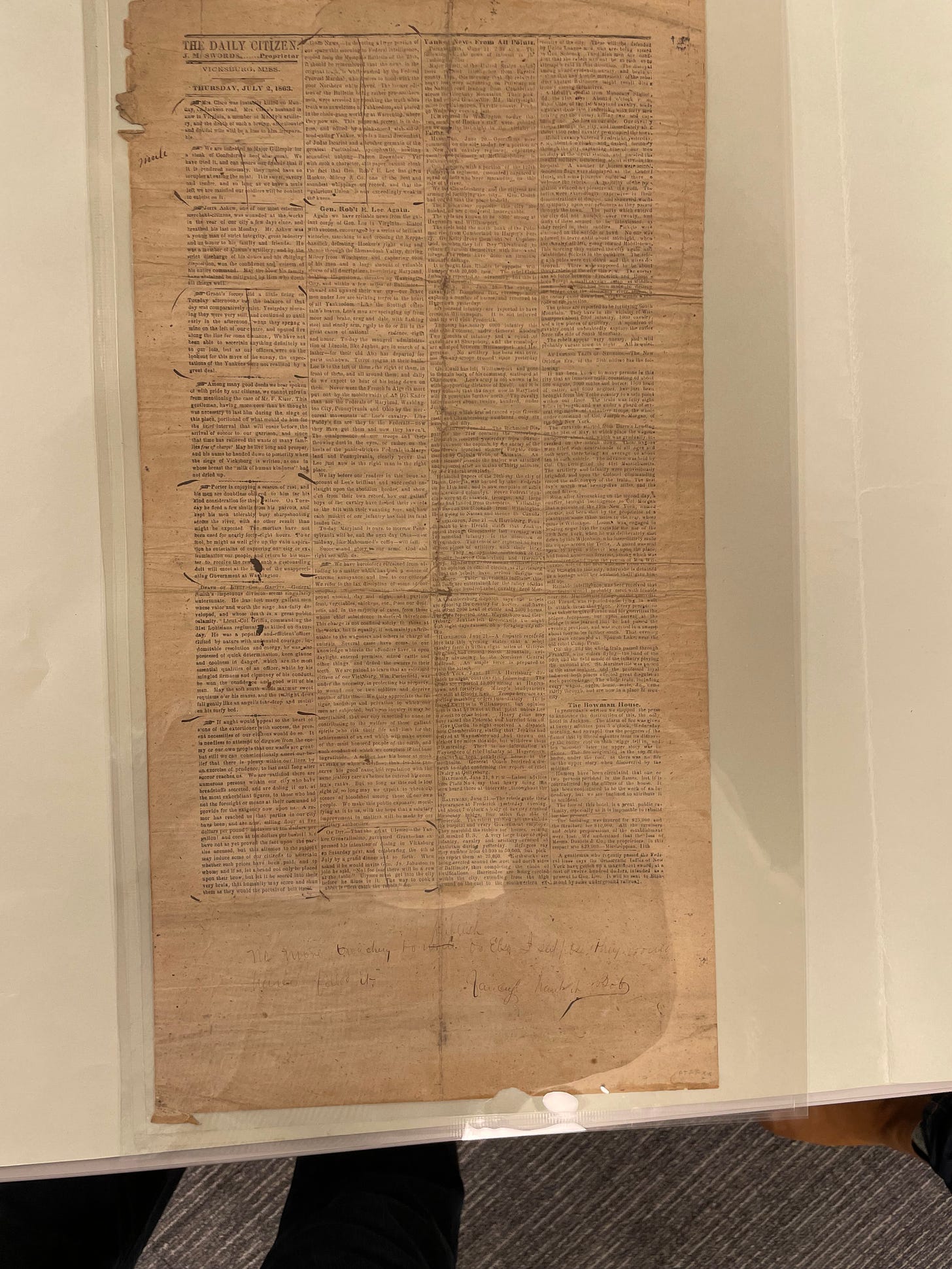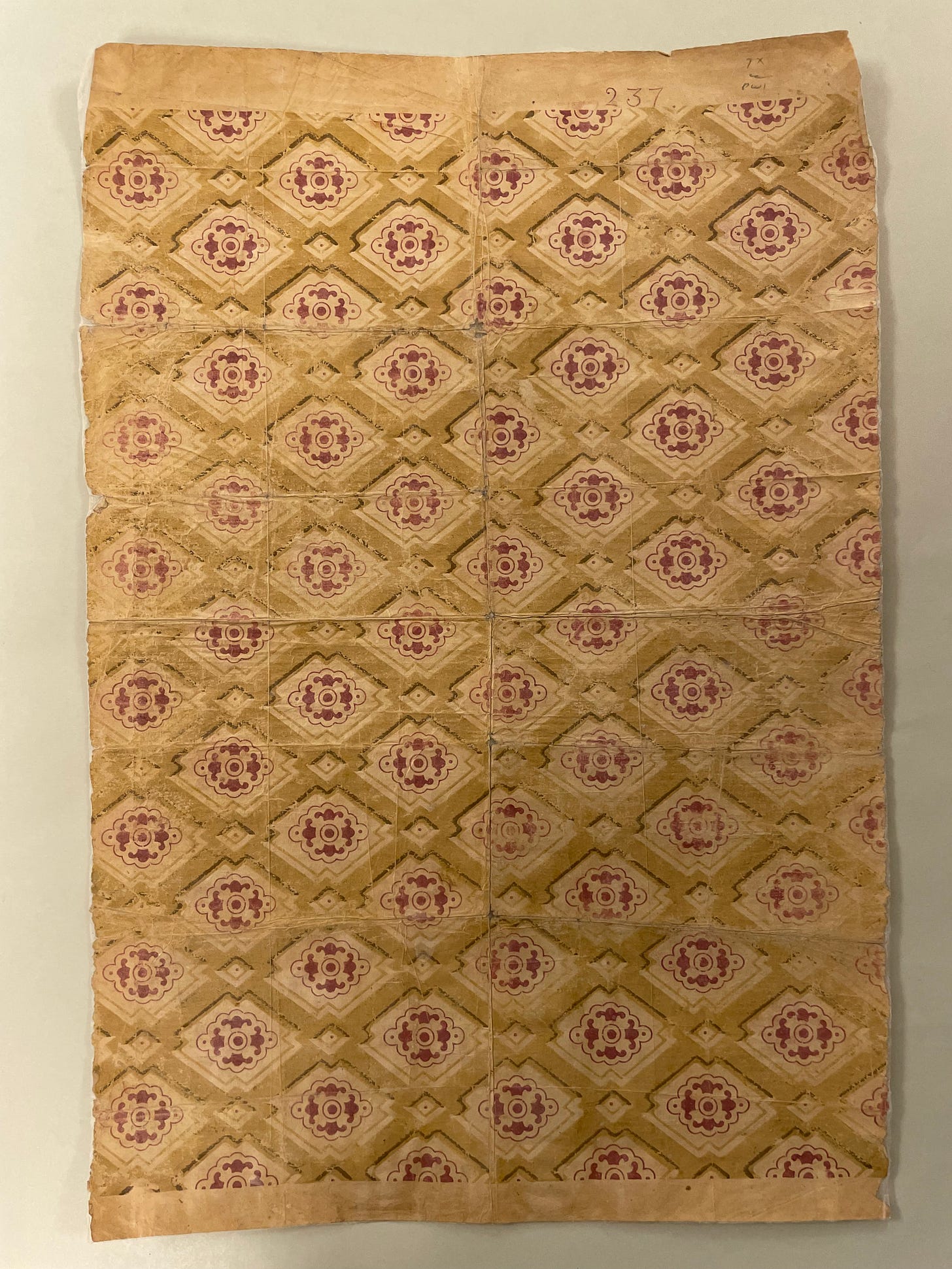We all know the stories of hardship and suffering that the people of Vicksburg, Mississippi experienced during the Union siege led by Gen. Ulysses S. Grant. Food was in short supply and many civilians sought shelter in the caves overlooking the Mississippi River, out of the range of enemy artillery. Those same guns signaled the arrival of freedom for the remaining enslaved population.
We also know that in two days time the town would surrender—the same day that Robert E. Lee’s Army of Northern Virginia marched back to Virginia after three days of fighting at Gettysburg.
And yet, on July 2 the residents of Vicksburg woke up to another issue of one of its local newspapers, The Daily Citizen. I find it remarkable that in the midst of a brutal siege people still sought out the news and that its publisher believed that it was still important to publish.
What did it include? The latest on Grant’s maneuvers:
Grant’s forces did a little firing on Tuesday afternoon, but the balance of that day was comparatively quiet. Yesterday morning they were very still and continued so until early in the afternoon, when they sprang a mine on the left of our centre and opened fire along the line for some distance. We have not been able to ascertain anything definitely as to our loss, but as our officers were on the lookout for this move of the enemy, the expectations of the Yankees were not realized by a great deal.
The newspaper also reported instances of good deeds that it hoped might buoy the spirits of its readers.
Among many good deeds we hear spoken of with pride by our citizens, we cannot refrain from mentioning the case of Mr. F. Kiser. This gentleman, having more corn than he thought was necessary to last him during the siege of this place, poriloned [sic] off what would do him for the brief interval that will ensue before the arrival of succor to our garrison, and since that time has relieved the wants of many families free of charge! May he live long and prosper, and his name be handed down to posterity when the siege of Vicksburg is written, as one in whose breast the ‘milk of human kindness’ had not dried up.
The news of Lee’s northern offensive after his victory at Chancellorsville is also discussed.
Again we have reliable news from the gallant corps of Gen. Lee in Virginia. Elated with success, encouraged by a series of brilliant victories, marching to and crossing the Rappahannock, defeating Hooker’s right wing and thence through the Shenandoah Valley, driving Milroy from Winchester and capturing 6000 of his men and a large amount of valuable stores of all descriptions, re-entering Maryland, holding Hagerstown, threatening Washington City, and within a few miles of Baltimore—onward and upward their war cry—our brave men under Lee are striking terror to the heart of Yankeedom….
Lee is to the left of them, the right of them, in from to them, and all around them; and daily do we expect to hear of his being down on them…
To-day Maryland is ours, to-morrow Pennsylvania will be, and the next day Ohio…
I find it interesting that the editor also chose to reprint a report out of New Orleans of an “immense train of Negroes” that had arrived in the city, which had been under Union occupation since the spring of the previous year.
Take some time to read through it on your own.
It’s important to resist the temptation to read back into the past as opposed to appreciating the fact that the immediate future remained unknown to the local residents of Vicksburg. As desperate as their situation was, they still held out hope that the siege would be broken or that Confederate successes elsewhere would provide relief.
They didn’t know that in two days time the city would be surrendered or that Lee’s invasion proved to be a failure. The attention to Lee’s victories speaks to the extent to which he had become a symbol of Confederate nationalism by the middle of the war.
I am struck by the sense of optimism that characterizes this issue and that it exists at all. It certainly helps us to appreciate the importance of disseminating the latest news even in the most desperate of situations.
This becomes all too apparent when you realize that by this time the newspaper was being published on the back of wallpaper. I’ve heard stories about this, but I never before had the opportunity to actually hold a copy.
It’s not just the content of the news that highlights the importance of information, but the material object itself. Did it come from the home of the editor or locals who volunteered their own property to ensure that publication of the news continue?
There are lots of questions that you could pose to this rich primary source. What would you want to know? How do you interpret this specific source?
Thanks to the staff in Special Collections at the Boston Athenaeum for sharing this with me.
Reminder: The ability to post comments will be limited to paid subscribers beginning on December 1.






Couple of thoughts:As a Star Trek fan the blessing to Mr. F Kiser “May he live long and proper” is notable!
Until I moved to Illinois to work, I knew very little of the western campaign of the war. When my colleagues learned I was a Virginian (and sadly, still a lost causer) they began to teach me that it didn’t all happen in the east! And so I’ve come to aver that Vicksburg was more important than Gettysburg, in that, as Lincoln said, “The Father of Waters again goes unvexed to the sea.” And that the victory brought Grant to lead the armies of the United States in the east, a general who would never let Lee slip from his grasp. I realize that there is a lot I do not understand in Meade’s decision to delay on July 4, which allowed Lee to cross back into Virginia. But it makes me angry that the suffering and dying continued for two more bloody years.